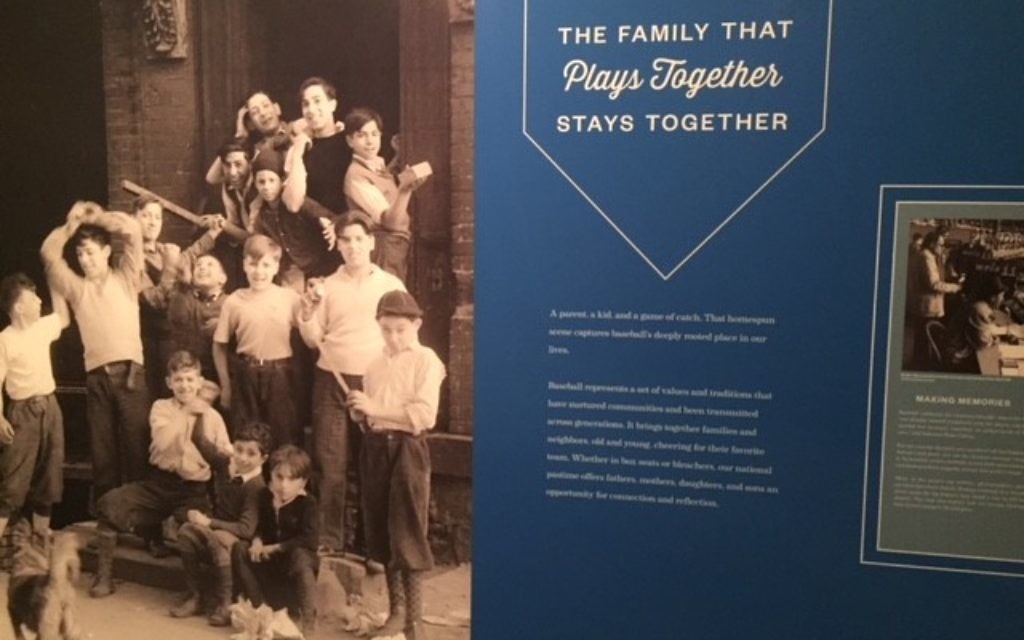A Father, a Son and Baseball
Just as a game bonded immigrants to a nation, so it created a connection between generations.
As the story goes, Solomon Schechter, then the president of the Jewish Theological Seminary, told the young scholar Louis Ginzberg as he joined the faculty, “You cannot be a rabbi in America without understanding baseball.”
This anecdote has been repeated numerous times, despite a lack of evidence that Schechter actually said it or, for that matter, ever attended a game or knew anything about baseball.
His grandson, however, was a fan.
Get The AJT Newsletter by email and never miss our top stories Free Sign Up
Baseball was a bond my father and I shared for more than five decades. Even as his faculties declined, baseball was an easy topic of conversation during my daily calls home.
I thought about him while taking a preview walk through “Chasing Dreams: Baseball & Becoming American,” an exhibit on display at the William Breman Jewish Heritage & Holocaust Museum until July 15.
A central theme of the exhibit is the role baseball played in helping immigrants assimilate into American culture, particularly in the first half of the 20th century.
If its intricacies confounded the adults, their children made the game their own, playing in the streets, vacant lots or empty fields. Baseball’s vernacular drifted into the newcomers’ use of English and provided a topic of conversation with people from outside their religious or ethnic community.
The reclusive author Terrence Mann understood this phenomenon, observing, “The one constant through all the years has been baseball. America has rolled by like an army of steamrollers. It’s been erased like a blackboard, rebuilt and erased again. But baseball has marked the time.”
My father was born in 1926 and grew up on the Upper West Side of Manhattan.
He was a steadfast New York Yankees fan, in good seasons and bad. As a boy, he listened to games on radio, read newspaper accounts and, on occasion, saw them play at Yankee Stadium.
Dad’s favorite player was Lou Gehrig, the son of immigrants, who dropped out of Columbia University to play professionally and whose demeanor contrasted with that of his most celebrated teammate, George Herman “Babe” Ruth. “Pride of the Yankees,” starring Gary Cooper as Gehrig, was among his favorite movies.
Hanging in my closet is the flannel replica of Gehrig’s No. 4 jersey I gave Dad as a birthday present.
On a bookcase in my office is a thickly padded left-hander’s mitt, with no webbing between the fingers, that dated to Dad’s World War II Navy service. He wore that glove when he taught me how to play catch.
In his book “Fathers Playing Catch With Sons,” the poet Donald Hall wrote, “Baseball is continuous, like nothing else among American things, an endless game of repeated summers, joining the long generations of all the fathers and all the sons.”
Dad’s loyalty was such that he sometimes wore a Yankees cap during his summer weeks in Maine, among Boston Red Sox fans.
He remained a Yankees fan throughout 60 years living in the Chicago area. That is why, despite growing up in northern suburbs teeming with Cubs fans, I followed the White Sox. It was an American League thing.
When Dad’s boss provided tickets to White Sox or Cubs games, his ritual included bringing homemade corned beef sandwiches and leaving around the eighth inning, to beat the traffic.
The son repaid the father in 1996, when the Atlanta Braves played the Yankees in the World Series. My parents flew in, and I took him to two games at Atlanta-Fulton County Stadium.
I have a framed photograph of us at one of those games. On those chilly October nights, he wore a Braves sweatshirt, albeit underneath his blue Yankees jacket.
Dad died shortly after the 2012 major-league season ended.
Over the next couple of years, I realized that I was paying much less attention to baseball. It took me a while to understand that because baseball had been part and parcel of our relationship, when he died, my interest in the game passed with him.
I rarely check the standings these days, but when I do, I look to see how the Yankees are faring.
Dad would appreciate that.





comments